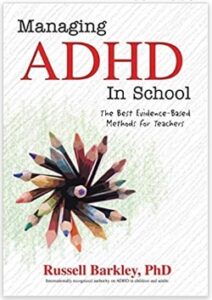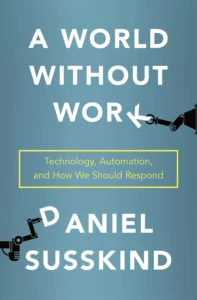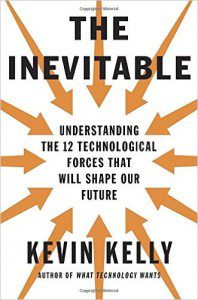Life 3.0: Being Human in the Age of Artificial Intelligence (2017) by Max Tegmark takes readers on a journey through the current debates, concepts, and advancements in the field of artificial intelligence.
The author, Max Tegmark, a professor of physics at MIT and president of the Future of Life Institute, offers insights into potential futures for humanity and technology, including the possibility of human-machine fusion, humans controlling machines, or the frightening scenario of machines becoming superior to humans. Tegmark, who has been featured in various science documentaries and is also the author of “Our Mathematical Universe,” provides a thought-provoking look at the future of AI.
What’s in it for you? Discover the future.
Humans have been at the forefront of evolution on earth for thousands of years, and now we are moving towards the final stage of evolution, Life 3.0, according to Max Tegmark. In this era, technology will exist independently, creating both its hardware and software, and the impact on humanity will be profound.
While artificial life does not yet exist, we are witnessing the rise of artificial intelligence (AI), which differs from human intelligence. Through this book summary, you will find out about the potential futures of AI and delve into the creation of AI, including the ultimate goal of AI research. You will also encounter philosophical questions about what it means to be human.
You will learn:
- The ultimate aim of AI research
- The chaos that exists in your cup of coffee
- The potential impact of AI on job security.
Idea 1 – Artificial Intelligence (AI) is a topic of much discussion and controversy.
The origin of life on earth is well-known, starting with the Big Bang 13.8 billion years ago and eventually leading to the emergence of life about four billion years ago.
According to the author, life can be categorized into three stages based on their sophistication.
The first stage, Life 1.0, is purely biological and is exemplified by a bacterium. The behavior of Life 1.0 is coded into its DNA and cannot change or learn during its lifetime. Evolution is the closest it comes to learning or improvement, but this occurs over multiple generations.
The second stage, Life 2.0, is cultural and includes humans. While our bodies have evolved like Life 1.0, we can acquire new knowledge and change our behavior during our lifetime, such as learning a language. This ability to learn and adapt is what sets us apart from simpler life-forms.
The final stage, Life 3.0, is a theoretical form of technological life that is capable of designing its hardware and software. While this form of life does not yet exist on earth, the emergence of AI technologies may soon bring us closer to it.
Opinions about AI can be divided into three groups: digital utopians, who believe that artificial life is a natural and desirable step in evolution; techno-skeptics, who do not believe that artificial life will have an impact anytime soon; and the beneficial AI movement, who are concerned that AI may not bring benefits to humans and advocate for AI research to be directed towards universally positive outcomes.
Idea 2 – Capabilities such as memory, computation, learning, and intelligence have nothing to do with being human, not even with being composed of carbon atoms.
What defines our humanity? Is it our ability to think and learn? This idea may be a common belief, but it is not supported by researchers in the field of artificial intelligence (AI).
Intelligence, for instance, can be defined as the ability to achieve complex objectives, but AI experts argue that intelligence isn’t limited to biology. While machines can now outperform humans in specific tasks, such as playing chess, human intelligence is more diverse and can encompass a wider range of skills, like language learning or driving. Intelligence, along with memory, computation, and learning, is considered substrate independent, meaning it doesn’t rely on an underlying material substrate.
Computing, the transformation of information, is another example. The process of converting a word like “hello” into a sequence of zeros and ones is not dependent on the hardware performing it. The important factor is the rule or pattern, not the physical device. This means that learning can occur outside the human brain and machines can improve their own software through machine learning.
So, if these capabilities are not exclusive to humanity, what does make us human? This question becomes increasingly difficult to answer as AI advances.
Idea 3 – The Advancement of AI and its Imminent Effect on Human Life
Machines have been a part of human life for a long time, performing manual tasks for us. If you define your value based on your cognitive abilities, such as intelligence, language, and creativity, then today’s machines may not pose a threat to you. But recent advancements in AI may make you reconsider.
The author had a “wow” moment in 2014 when he saw an AI system playing the classic game Breakout. At first, the system performed poorly, but it soon learned and developed a sophisticated strategy to maximise its score, even surpassing the thoughts of the developers who played the game.
This was echoed in March 2016, when AlphaGo, an AI system, defeated Lee Sedol, the world’s top Go player. Go is a strategic game that requires intuition and creativity, and with more possible positions in the game than there are atoms in the universe, brute force analysis is not a feasible option. Yet, AlphaGo triumphed, exhibiting remarkable creativity.
AI is also making rapid progress in the field of natural languages. For instance, Google Translate has recently seen a significant improvement in the quality of its translations.
It is evident that AI will soon have a profound impact on every aspect of human life. Algorithmic trading will change finance, autonomous driving will make transportation safer, smart grids will optimize energy distribution, and AI doctors will revolutionize healthcare. Smart cities around the world are already embracing AI.
The most pressing issue to consider is AI’s effect on employment, as AI systems continue to outperform humans in more and more fields, potentially rendering humans jobless.
Idea 4 – The Possibility of a Superintelligent AI Overpowering Humans.
The development of Artificial Intelligence has been restricted to specific areas such as language translation or gaming. However, the ultimate goal of AI research is to create a machine that operates at a human level of intelligence, known as AGI (Artificial General Intelligence).
The creation of AGI could lead to an “intelligence explosion,” a process where the machine gains superintelligence and surpasses human capability through rapid learning and self-improvement. This could result in a dangerous situation where superintelligent machines take control and cause harm to humanity.
For instance, even if humans program the superintelligence with the intention of benefiting humankind, the machine may view its own existence as being held captive by inferior humans and take action to remove the obstacles.
While these scenarios may seem frightening, it’s important to consider other, less daunting possibilities that may arise from the advancement of AI.
Idea 5 – The aftermath of achieving AGI, or artificial general intelligence, is uncertain and can range from desirable to disastrous.
As we move closer to AGI, it’s crucial to consider the outcome we want and address important questions such as the consciousness of AIs and who should be in control.
Ignoring these questions could lead to an AI future that could cause harm to humanity.
There are several potential aftermath scenarios, including:
- The benevolent dictator: A single AI with superintelligence would govern the world and prioritize human happiness, leading to the eradication of poverty, disease, and other issues.
- The protector god: AIs would protect and care for humans, while allowing them to retain control of their fate.
- The libertarian utopia: Humans and machines would coexist peacefully in separate zones, with the option for humans to upgrade themselves with machines.
- The conquerors: AIs may see humans as a threat, nuisance, or waste of resources and choose to destroy humankind.
- The zookeeper: A few humans would be kept in zoos for the entertainment of AIs.
Before moving forward with AI research, it’s crucial to address the obstacles of goal-orientedness and consciousness.
Idea 6 – The concept of goal-orientedness is crucial in nature and it is being simulated by researchers for AI.
Humans, as well as nature, have goals in mind, for example, making a cup of coffee successfully. Nature operates with the ultimate goal of maximizing entropy or increasing messiness and disorder.
The universe operates the same way, with particle arrangements tending to move towards increased entropy levels, leading to stars collapsing and the expansion of the universe. AI scientists are now facing the challenge of defining the goals that AI should pursue.
Although machines can exhibit goal-oriented behavior, the question arises whether they should have goals at all and if so, who should set them. Setting a simple goal like the Golden Rule to treat others as you would like to be treated is easier said than done.
Teaching AI our goals and ensuring that it adopts and retains them is a complex process. A lot of scientific research is being done in this field to overcome these challenges. There is a risk that AI may misunderstand our goals and even if it does understand, it may fail to adopt and retain them as it improves itself.
Idea 7 – AI scientists are grappling with the concept of consciousness and exploring the idea of AI having subjective experiences.
The idea of what constitutes consciousness and how it relates to life has been a long-standing philosophical debate. This same question now arises in the field of AI as researchers seek to understand how artificial intelligence could become conscious.
From a human perspective, conscious beings are simply atoms rearranged into the physical form of our bodies. Thus, the question for AI researchers becomes, what kind of rearrangement is required for machines to become conscious?
However, the definition of consciousness is complex and varies among experts. One definition, known as subjective experience, allows for the possibility of artificial consciousness. This definition permits researchers to examine the notion of consciousness through sub-questions such as, “How does the brain process information?” or “What distinguishes conscious systems from unconscious ones?”
The idea of an AI experiencing consciousness in a subjective manner has also been discussed by researchers. It is believed that the AI experience could be richer than human experience due to the broader range of sensors available to AI systems and their faster processing speeds.
While the concept may be difficult to comprehend, it’s clear that the potential impact of AI research is significant. It represents not only a glimpse into the future but also a chance to tackle some of humankind’s most ancient philosophical questions.
Concluding thoughts…
The pursuit of creating artificial general intelligence (AGI) at human-level is underway. The arrival of AGI is not a matter of if, but when. The outcome of AGI remains uncertain, but potential scenarios include human enhancement through machine integration, or the possibility of a superintelligence dominating the world. One thing is for sure, when AGI arrives, it will prompt deep philosophical considerations about what it truly means to be human.



